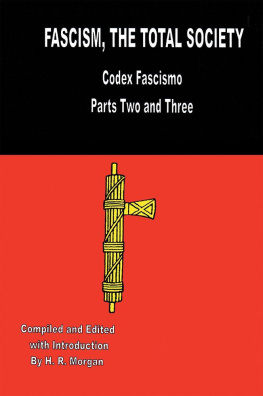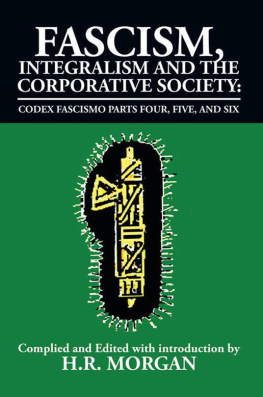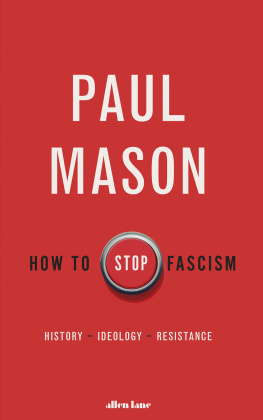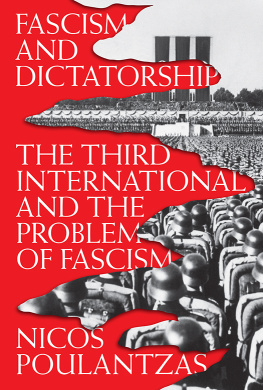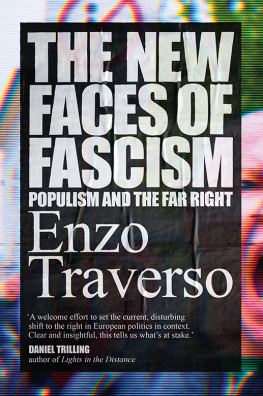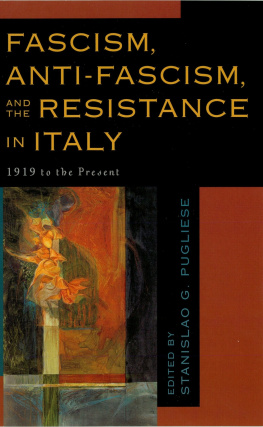FASCISM, THE TOTAL SOCIETY
Codex Fascismo
(Parts Two and Three)
A Compendium of Fascist Thought Compiled and Edited with Commentary and an Introduction by H. R. Morgan
H.R. Morgan
Copyright 2013 by H.R. Morgan.
Library of Congress Control Number: 2013914971
ISBN: Hardcover 978-1-4836-8650-9
Softcover 978-1-4836-8649-3
Ebook 978-1-4836-8651-6
All rights reserved. No part of this book may be reproduced or transmitted in any form or by any means, electronic or mechanical, including photocopying, recording, or by any information storage and retrieval system, without permission in writing from the copyright owner.
Rev. date: 10/18/2013
To order additional copies of this book, contact:
Xlibris LLC
1-888-795-4274
www.Xlibris.com
Orders@Xlibris.com
135681
CONTENTS
Some Aims And Principles Of British Fascism
In The Conduct Of Imperial And Foreign Affairs
A Letter to the Publisher
Greetings,
This note is meant to allay any possible concerns you may have about the publishing of this little book.
A study of this kind cannot gain accuracy by strictly objective research. Simply turning the pages of countless books provides only a two dimensional image of the subject. A more experiential method must be employed. To gain the subjective data I spent many years going among the various Fascist circles; I was privileged to experience Fascism first hand in its actualized state. I was to learn through action and their own words, spoken directly to me, exactly what their doctrine and ideology consists of. What their goals and what their motivations truly are. And, I was to see clearly the differences that stand out between German National Socialism and European Fascism as well as Fascism worldwide.
To accomplish this I also spent some time among the National Socialist and Marxian Socialist organizations. There truly is no substitute for personal experience. This experience equipped me to make informed statements in this area of study; and, there is a real difference between actualized and doctrinal Fascism, and the phenomenon of German National Socialism. What follows here are some of the results which my research has uncovered for the interested reader to benefit from.
I know that the subject of Fascism and totalitarianism ( or Corporate Syndicalism ) has been a touchy one. It is a word which has been inaccurately associated with German National Socialism (Nazism) and Soviet authoritarianism for a very long time. It is a misnomer; as totalitarianism is a term coined by the Fascists to describe their concerned ideological all-encompassing social doctrine for the citizenry touching every area of their lives for their own betterment and general welfare. Other nations have been so labeled. The reason for this is the decision that many countries made in the 1940s to join with Germany in its war against Communist Russia. But, totalitarianism is, indeed, the policy of a benevolent government which puts its own people first.
In reality, the policies of Fascist Italy, Fascist Hungary, Fascist Romania, Falangist Spain, Salazars Portugal, and the French, English and Irish Fascist Parties of the 1920s and 1930s on up to today, have very little in common with the aims and methods ( ultimate goals ) of the racial and megalomaniacal evolution which happened to German National Socialism after the year 1936.
German National Socialists of that time ( after 1937-1938 ) had only a few real goals:
Complete authoritarian control of the German people.
Absolute dictatorship.
Racist policies and the myth of Germanic racial superiority.
The elimination of what they considered undesirable social elements through mass liquidation (organized systematic genocide).
Military conquest of other nations and creation of a German empire similar in structure to that of the then Soviet Union.
The actual goals of Fascism were as follows:
Creation of a Corporate State in the respective countries whereby Workers Unions would be created along with Consumers Unions, Management Unions, and Finance Unions called Syndicates to create a national government having the direct participation of the public (i.e. direct democracy).
Total restructuring of the import and export industries; the exclusion of less costly foreign products, those which are already manufactured in-country, from domestic markets, to ensure employment of citizens.
Development of domestic resources.
Restoration of the natural environment ( it is here where the Italians and their friends were decades ahead of other countries with environmental policies as well as having some of the first humane treatment laws for animals ).
Combat international global speculative Finance Capitalism and industrial/import-export monopolization.
Reasons for their siding with Germany
W ith the devastation of national economies and the social misery created by the Great Depression of the 1930s, countries needed to try some pretty radical ideas to help their people who were suffering under the strain of poverty and from lack of availability of social necessities.
Public health was at a low level due to deforestation, unbelievable industrial pollution, lack of availability to the public of basic medical services, an inadequate supply of nourishing foods, unsafe and unhealthy living and work environments, ( all this with the resulting phenomenon of rampant crime ) and an unbearable level of worker unemployment. ( Fascist Italy and the Fascist Parties of France of the 1930s were also among the first to institute through law the eight hour work day and the forty four hour work week. )
These were the initial issues motivating the Fascists. There were also the added stresses to the nations caused by mass worker strikes and street violence instigated ( a proven historical fact) by the Soviet Union. The agents of Moscow were seeking to further destabilize these countries in order to create Communist satellite nations to further their influence and enrich Soviet Russia.
This added national distress caused the Fascists to have to wage a limited civil war before being able to begin advancing their domestic agenda. It is a fact that Fascism was the brain child of returning soldiers from the trenches of the First World War, those who had gone through the hell and misery of death and disease, who had realized in all those hours of thinking and conversations that what they were really fighting for was not to protect their respective countries, but rather to further the interests of Global International Capitalism.
After fighting each other for over fifty years, members of the extreme radical left (or Socialists) and members of the radical extreme right (or Nationalists) were conscripted and thrown together and forced to coexist for their mutual survival in the day to day terror of war. These men ( and women ) saw that international finance Capitalists and materialist Communists were not interested in the lives and the living conditions of the people and especially of the workers in their countries, but only with the fattening of their wallets and their own increase of influence and personal power.
Thus, as one of the results Fascism took on a quasi-military look and discipline. This disciplined melding of the most extreme radical elements better enabled them to fight the Marxist agents and others deluded with the promises of personal power that Soviet Russia was making to them. When they returned home they were the Capitalist and Communist materialistic systems worst nightmare.
When the Fascists began their fight, entire cities in their respective countries had already been taken over by the Soviets. Whole regions were under Marxist domination. Violence was everywhere along with violent reprisals against those people who spoke out against it. Murders, beatings, maimings, rapes and other crimes were meted out by the Communists as punishments and as disciplinary measures.
Next page
